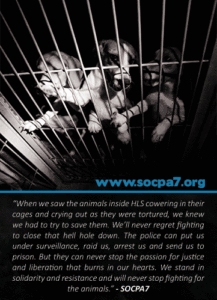In May 2012 three people were arrested for a protest at a supplier of HLS, accused of SOCPA 145 and 146 and released with strict bail conditions. The conditions included a ban on protesting against HLS and residency orders (sleep at the same address each night). A month later a fourth person was also arrested. The four were repeatedly rebailed over the next 8 months, despite it being very bad practice (and fairly unusual) to delay a decision to charge for so long.
The reason for the delay became apparent in January 2013, when six people (including the four already on bail) were raided and arrested for conspiracy to commit SOCPA 145 and 146 in relation to SHAC, between October 2011 – June 2012. The conspiracy covered 25 incidents, including the protest the four suspects were already on bail for (which was dropped as an individual charge). The six were bailed again and banned from communicating. Shortly afterwards a seventh person was also arrested.
During the raids armed police forced entry into the houses of the suspects, their partners and mistakenly, their neighbours. Doors were broken and many items were seized, including electronics and personal items unconnected to the case (and not covered by the warrants). Despite promises to return the property, most of it is still held by the police.
In June 2013 the seven defendants were formally charged with SOCPA 145. As with many previous cases SOCPA 146 was dropped, probably due to the vague nature of the offence making it difficult to prosecute. The police curiously lessened the bail conditions, removing the residency orders and ban on communicating with each other.
A few weeks later a hearing was held at Westminster Magistrates Court, before the case was passed to Southwark Crown Court in September 2013. The trial is fixed for 22nd September 2014.
The prosecution case apparently consists of 3 folders of evidence, although so far only some of this has been provided to the defence. The evidence includes witness statements, CCTV and phone records. The trial is expected to last at least 6 weeks.
Beneath the masses of evidence material and legal terminology, the only thing the defendants are accused of doing themselves is taking part in protests. The incidents consist of 23 protests (being classed as harassment and public order offences) and 2 incidents of direct action (criminal damage). The defendants are alleged to have attended some of the protests, but there is no evidence that they had involvement or knowledge of the direct action. Some of the defendants only attended a couple of protests.
The UK authorities are so desperate to stop people campaigning against vivisection, especially at HLS, that attending protests has led to these campaigners facing prison on criminal conspiracy charges.
With the increasing repression of animal rights activists, it’s important that we show support for the SOCPA7 and raise awareness of this case. If they can be sent to prison for protesting, you could be next.
